► We round up the best hybrid family cars
► Ideal if you want low running costs
► From small cars to seven-seat SUVs
In 2025, the best hybrid cars cover every segment, from everyday runabouts to luxury and sports cars to the best hybrid SUVs. But you get perhaps the finest choice when you go searching for the best hybrid family cars.
Whether you’re a large family in need of three rows of seats or a smaller family who wants to go hybrid to minimise your running costs, there are choice options across a wide range of sizes and prices. Every kind of hybrid technology is represented, too, from the minimal complexity of mild-hybrid tech right through to useful zero-emissions capability of the best plug-in hybrid models. There are some clever conventional self-charging hybrids available, too.
The best hybrid family cars at a glance
On this page you’ll find CAR’s expert take on the very best family hybrids on sale in the UK. Whatever your needs, whatever your tech preference and whatever your budget, there should be a hybrid family car here to suit you.
The best hybrid family cars 2025
Honda Civic
Best for: All-round practicality in a bigger-on-the-inside package
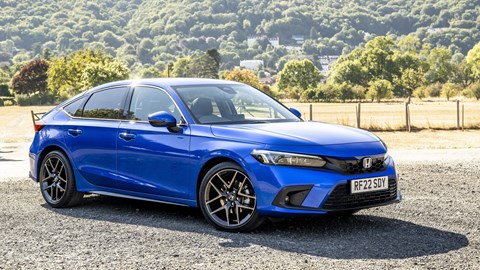
Pros: Build quality, performance, efficiency
Cons: Not the most spacious shape, quite expensive these days
Our sister site, Parkers, awarded the Honda Civic the Car of the Year gong for 2023, and it’s well deserving of that accolade. Its hybrid system is based around a 2.0-litre petrol, and with 181bhp on offer it’s both powerful and efficient. It’s brilliant to drive, too.
The Civic’s interior is well-built, spacious and straightforward, with plenty of room in the back seats for child seats and space in the boot for a big pushchair. It effectively proves that the default family car doesn’t have to be a massive SUV. It’s still the best hybrid family car you can buy at the moment.
Read our full Honda Civic review
Volkswagen Multivan
Best for: Moving as many people as possible
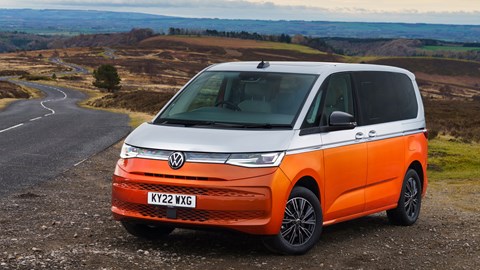
Pros: LWB, efficiency, class-leading
Cons: 1.4-litre hybrid may lack power for some
Vans don’t have to be agricultural diesels anymore. In fact, the Multivan – which replaced the Transporter-based Caravelle in VW’s lineup – is more closely related to the brand’s passenger cars, which means it can be fitted with VW’s excellent 1.4-litre plug-in hybrid powertrain.
You get seven seats big enough for adults, and long-wheelbase models have extra luggage space perfectly suited to family odds and ends, and a driving experience that’s nothing like a van – it’s comfortable, refined and efficient. Volkswagen isn’t currently taking orders for the hybrid Multivan, though many dealers still have new stock available. It’s expected that an updated version is on the way shortly with Volkswagen’s upgraded plug-in hybrid setup.
Read our full VW Multivan review
BMW X5
Best for: Long electric-only range
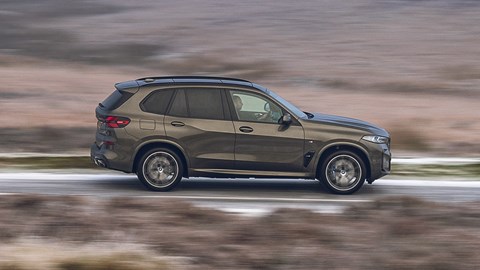
Pros: Luxury, performance, long electric range, premium quality
Cons: Very little
The X5 is one of the finest luxury SUVs you can buy – and one of the best hybrid family cars or SUVs – outright. The xDrive 50e is based around a beefy six-cylinder petrol so it doesn’t feel nearly as asthmatic as many PHEVs do, and it’ll cover a claimed 67 miles on electricity, or more like 50 miles in real-world conditions.
The X5 is great to drive – comfortable yet satisfyingly nimble for such a big car. The interior’s fantastic, too, though does verge on the gauche depending on what you do with the ambient lighting… and don’t get us started on the optional illuminated grille. Regardless, the X5’s a brilliant SUV – and that’s reflected in the price tag.
Read our full BMW X5 review
Mercedes E-Class
Best for: Interior tech to impress your mates
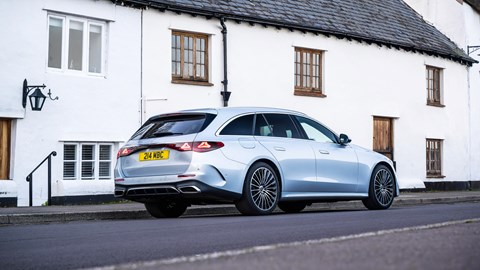
Pros: Long electric-only range, stunning interior, vast roominess
Cons: Boot is smaller than a regular E-Class, costs LOTS of money
Mercedes makes some of the most impressive hybrids around, whether you choose one of its fuel-saving mild-hybrids or a plug-in hybrid with an impressive electric-only range. When it comes to the E-Class Estate, you have the choice of both. A diesel mild-hybrid E220d can achieve nearly 60mpg, while either the petrol E300e and diesel E300de plug-in hybrids can travel up to a claimed 68 miles before the engine wakes up – and more than 50 miles in normal conditions.
Mercedes has thrown everything at its new E-Class Estate, with an interior brimmed with technology. For some, the OTT ambient lighting that changes colour to the song, or seats that vibrate to the music, will be a step too far. But if you want a premium product in 2025, it needs lots of bells and whistles and this wagon won’t disappoint. It’s also an excellent family car, with vast interior space, and a huge boot. Just be aware that the boot of the plug-in hybrids is smaller than regular versions.
Read our full Mercedes E-Class Estate review
Honda CR-V
Best for: Fuss-free family motoring
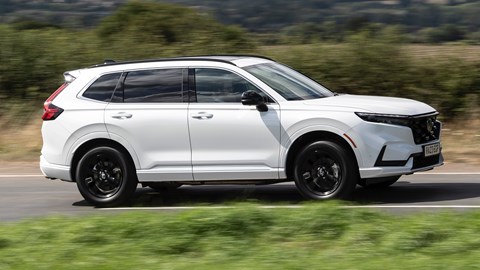
Pros: Spacious and flexible interior, very comfortable, dependable
Cons: Not very exciting, expensive
While we wouldn’t say the Honda CR-V is overall one of the best hybrid cars you can buy, it ranks highly on our list for the best hybrid family cars? Why? Well, while we often judge a car on its excitement and handling, these things aren’t quite so important on a vehicle of this type.
Instead, factors such as comfort, spaciousness and reliability take greater importance, and in those three areas you’ll struggle to beat the new Honda CR-V. The firm’s largest SUV in Europe is now only sold as a hybrid. with a choice of a self-charging and plug-in hybrid. Honda claims up to 50 electric miles is possible from the latter.
Read our full Honda CR-V review
Lexus NX
Best for: Those who appreciate a plush interior and interesting exterior styling
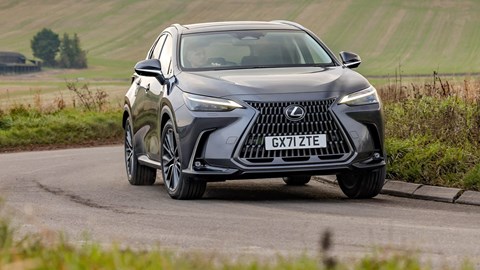
Pros: Lexus quality, better infotainment, comfortable ride
Cons: Styling isn’t for everyone
Premium, comfortable, good to drive and since it’s a Lexus you know it’ll be dependable. There’s plenty to recommend the NX, not least its choice of self-charging or plug-in hybrid powertrains. Both are good, but the plug-in really stands out with up to 40 miles of pure electric range – enough for even the most taxing school run without ever touching petrol.
Even the old Lexus bugbear of poor infotainment is no longer an issue – and the NX has some clever family-friendly features like electronic door latches that won’t allow you to open the door into the path of oncoming traffic.
Read our full Lexus NX review
Honda Jazz
Best for: Life in the city
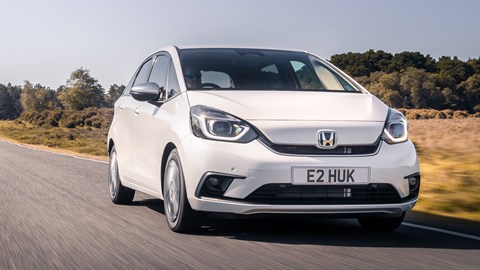
Pros: Clever engineering, perfect for the city, efficiency and range
Cons: Might be too small for some
Families come in all shapes and sizes – and some of them don’t need a massive SUV or people carrier. As small cars go, the Honda Jazz is as practical as it gets thanks to its ‘Magic’ rear seats and tall interior that gives loads of space for passengers. The boot’s a little smaller, but if your family’s outgrown a bulky pushchair it’ll accommodate plenty.
And its clever hybrid system is perfectly suited to the Jazz – around town it acts like a range extender with pure electric drive for nippy performance, but changes to direct drive at faster speeds for better economy. It’s smooth, efficient, has plenty of punch for a small car and works really well.
Read our full Honda Jazz review
Dacia Jogger
Best for: Value
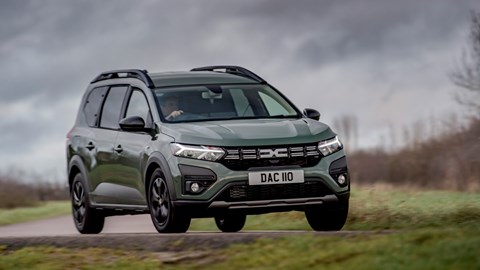
Pros: Amazing value, practicality is good, pretty good engine
Cons: Euro NCAP score will turn off some
The Dacia Jogger is one of the cheapest new cars on sale, period – and this hybrid version is still less than £23,000, making it comfortably one of the cheapest hybrid cars you can buy. That’s an amazingly low price tag for a hybrid seven-seater family car, but it’s what we’ve come to expect from Dacia.
The Jogger’s hybrid drivetrain is a little clunky and some family buyers may be put off by the Euro NCAP score (hint: you probably shouldn’t be), but three rows of adult-sized seats, a pretty powerful engine for a lightweight car and all the equipment you reasonably need for such a low price can’t be ignored.
Read our full Dacia Jogger review
Toyota Corolla Touring Sports
Best for: Those wanting an economical estate car
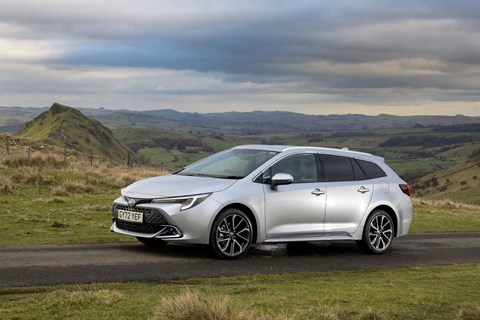
Pros: Ease of use, reliability, exceptionally efficient
Cons: Other estates have larger boot, fairly expensive
Nobody has made hybrid cars for as long as Toyota – or nearly as many – and that shows with its cars’ exceptional fuel economy and low CO2 emissions. The firm’s best hybrid family car, at least if you don’t want an SUV, is the Corolla Touring Sports estate. It’ll return almost 60mpg, and as its a Toyota, you won’t need to worry about reliability, and if you get it serviced at one of its dealers, the warranty will last for up to 10 years.
Is it exciting? No, definitely not, but it is solid family transport with its useful interior and impressively comfortable ride. Generous equipment levels and plenty of safety kit also helps to justify the Corolla’s slightly more expensive price too.
Read our full Toyota Corolla Touring Sports review
How we tested
As with every review on CAR, each of the models has been driven extensively by our exceptionally experienced team of leading motoring journalists and specialist writers. With hybrids and plug-in hybrids especially, we take extra care when looking at fuel economy. Take a look at how we test cars to find out more.
What’s the best hybrid for large families?
All of the hybrid cars on this list are great for medium-sized families, but if you need more room it’s worth looking at a hybrid SUV or a seven-seater hybrid car. Featuring more room for people and more room for luggage too, they combine all the thriftiness of the best hybrid cars with the flexibility and space of large vehicles.
Depending on your budget, it’s also worth looking at the second-hand market too. Check out our guides for the best used hybrid SUVs and the best used seven seater hybrid cars.
Is it still worth buying a hybrid car?
Especially in the last few years with diesel becoming a dirty word, there’s been a proliferation of hybrid cars across every market sector. Hybrids aren’t always perfect, and often lack some driver involvement – but how engaging do you really want your family bus to be? Every car on our list here is decent to drive, but all suffer the slightly disconnected feeling that comes from two separate power sources being shuffled around independently of the driver.
They have other benefits, though. All the cars on this list offer the potential for low running costs – whether that’s outright great fuel economy in the case of the self-charging hybrids, or the ability to cover some miles on electricity alone in the case of the plug-in hybrids.
Low CO2 emissions and no supplemental diesel charge means petrol hybrids attract appealingly low company car tax, as well as reduced first-year VED.
We’re concentrating this list on the best self-charging hybrid and the best plug-in hybrid family cars. While there are many appealing mild hybrid family cars, these offer only a small benefit compared to a standard petrol or diesel engine – and in most cases, directly replace them in a manufacturer’s range.
Are hybrid cars more expensive to insure?
Speaking generally, you will pay slightly more to insure a hybrid car compared to a petrol or diesel equivalent. That’s because the cost of replacement parts, especially the key hybrid components are costly to replace. However, because of the popularity of hybrid cars, the difference is narrowing. A hybrid will be cheaper to insure than an electric car, too.
Which hybrid has the best fuel economy?
The first thing to note is that you’ll notice a big difference between the quoted fuel economy figures between a self-charging hybrid and a plug-in hybrid. That’s because the larger batteries used in the latter enable a longer electric-only range (when charged), but the figures are often very tough to achieve unless nearly all your miles are driven on electricity.
The most efficient plug-in hybrids are ones that resort to a ‘self-charging’ setup once the main battery charge is depleted. From our testing, Toyota and Ford’s PHEVs are the most effective here, each returning more than 50mpg.
In terms of normal self-charging hybrids, the general rule is that the smallest cars will be the most efficient – such as the Honda Jazz. That said, Honda and Toyota’s hybrid cars are usually the best for fuel economy.